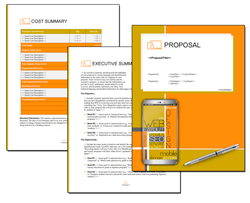What is the Stakeholders chapter used for?
Proposal Kit Professional Bundle adds more design themes, all six Contract Packs,
a project management library, and Expert Edition software.

Illustration of Proposal Pack Entertainment #9
We include this Stakeholders chapter template in every Proposal Pack, along with thousands more. You assemble this chapter with others in various combinations to create custom-tailored business proposals, plans, reports, and other documents. Proposal Packs apply custom visual designs to the templates, giving the final documents a consistent professional finish.
 DOWNLOADABLE, ONE-TIME COST, NO SUBSCRIPTION FEES
DOWNLOADABLE, ONE-TIME COST, NO SUBSCRIPTION FEES
Overview of the Stakeholders Chapter
In the field of creating comprehensive business proposals, the Stakeholders chapter serves a role. This section is designed to outline and detail all the parties who have an interest or are impacted by the proposal's outcomes. Recognizing stakeholders is crucial because their interests and reactions can significantly influence the success of a project or initiative. In a well-structured proposal, this chapter helps provide clarity and addresses the concerns of those who will be affected by the proposal's implementation.
How is the Stakeholders Chapter Used?
The Stakeholders chapter is used in a business proposal to identify and describe each party that will be impacted by the proposed initiative. This can include individuals, groups, or organizations. The purpose of this chapter is to acknowledge these parties' stakes in the project, which not only helps in tailoring the proposal to address their specific needs and concerns but also assists in building a robust strategy for stakeholder engagement. Properly identifying and describing stakeholders ensures that the proposal presenter is aware of all the influences and can plan the project phases accordingly.
What is Included in the Stakeholders Chapter?
Typically, the Stakeholders chapter includes:
- Identification of Stakeholders: A comprehensive list of individuals, groups, and organizations that are directly or indirectly affected by the proposal.
- Description of Interests: An explanation of what each stakeholder stands to gain or lose from the project, detailing their specific interests.
- Potential Impact Assessment: An analysis of how the proposal might affect each listed stakeholder.
- Engagement Strategies: Suggestions or plans for how to communicate with and involve stakeholders throughout the project lifecycle.
This structured approach ensures that all parties are considered, and their inputs are valued in the planning and execution of the proposal.
Use Case Examples for the Stakeholders Chapter
- Finance Proposals: Identifying investors, regulatory bodies, and clients who will be impacted by financial changes or new financial projects.
- Insurance Policies: Outlining the stakeholders such as policyholders, insurance agents, and regulatory agencies involved in new insurance offerings.
- Legal Services: Detailing all parties affected by legal proceedings or the introduction of new legal services, including clients, opposing parties, and court systems.
- Patents and Inventions: Listing inventors, potential manufacturers, competitors, and intellectual property offices as stakeholders in patent proposals.
- Business Opportunities: Identifying potential business partners, local communities, and competitors when proposing new business ventures.
- Franchise Proposals: Including potential franchisees, existing franchises, and market competitors as stakeholders.
- Vending Contracts: Outlining venue owners, suppliers, and end consumers as stakeholders in vending proposals.
- Relationship Management: Describing all parties involved in partnership or relationship management proposals, such as suppliers, clients, and intermediary agencies.
Key Takeaways
- The Stakeholders chapter is important for identifying all parties interested in or affected by a proposal.
- It includes identification and detailed descriptions of each stakeholder's interests and potential impacts.
- Properly addressing stakeholders in a proposal helps in planning effective engagement strategies.
- Stakeholder analysis is crucial across various fields, including finance, legal, patents, and more, to ensure all perspectives are considered.
- Effective stakeholder identification can significantly enhance the success potential of a proposal by ensuring all parties' concerns and needs are addressed.

Illustration of Proposal Pack Web #5
 What Our Clients Say
What Our Clients SayI would recommend this software to any small business that regularly creates proposals for either products or services. The ability to use customizable templates to quickly select and create a professional looking and sounding proposal is extremely valuable. I have been using the product since version 4.5 and each upgrade is easier to use with better features."
 4.7 stars, based on 845 reviews
4.7 stars, based on 845 reviewsAlternate Chapters
Related Chapters
Samples Using the Stakeholders Chapter
Document Layouts Using the Stakeholders Chapter

The Stakeholders chapter and other chapters are integrated into a Word document as illustrated here in the Proposal Pack Tech #9 design theme. There are hundreds of design themes available, and every design theme includes the Stakeholders chapter template.
A proper business proposal will include multiple chapters. This chapter is just one of many you can build into your proposal. We include the complete fill-in-the-blank template in our Proposal Pack template collections. We also include a library of sample proposals illustrating how companies in different industries, both large and small, have written proposals using our Proposal Packs. This template will show you how to write the Stakeholders.
We include a chapter library for you to build from based on your needs. All proposals are different and have different needs and goals. Pick the chapters from our collection and organize them as needed for your proposal.
Using the Proposal Pack template library, you can create any business proposal, report, study, plan, or document.
 Ian Lauder has been helping businesses write their proposals and contracts for two decades. Ian is the owner and founder of Proposal Kit, one of the original sources of business proposal and contract software products started in 1997.
Ian Lauder has been helping businesses write their proposals and contracts for two decades. Ian is the owner and founder of Proposal Kit, one of the original sources of business proposal and contract software products started in 1997.By Ian Lauder
 Published by Proposal Kit, Inc.
Published by Proposal Kit, Inc.


 Cart
Cart
 Facebook
Facebook YouTube
YouTube X
X Search Site
Search Site